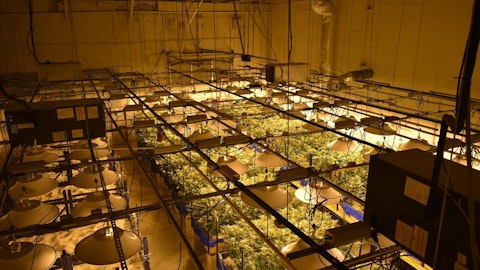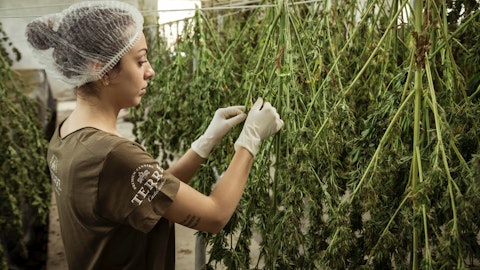Jon Decourcey: Hey, guys. Good morning. Congratulations on the continued execution here. Just to follow-up on the Massachusetts pricing environment, kind of two questions there. Number one, how will the mix shift with the opening of the Beverly store, Norwood as well as the Quincy store in the near term? How is that mix shift? What’s that going to look like from wholesale to retail? And how is that going to impact your margins since you guys seemingly wouldn’t get the same boost from vertical integration that others get just because you’re doing so well with the wholesale side of things?
Jon Levine: Thank you, Jon, and good morning. I’m going to let Tim Shaw speak about the mix and Susan can add in anything on the margin. Tim, do you want to take a way to add the answer?
Tim Shaw: Sure. Thanks Jon. Appreciate the call. The mix going between our retail and our wholesale is the exact reason why we are expanding in our cultivation and production areas in Massachusetts. The Quincy acquisition, which we announced recently, allows us to take all of our R&D out of our production floor. So pheno-hunting takes up space during production. Our R&D in the kitchen and in the lab takes up space, time and effort that we’re going to now be able to move to our Quincy location, allowing us to produce more out of our New Bedford facility. That’s going to partially allow us to sustain our wholesale revenue while fulfilling the needs of our new dispensaries
Jon Decourcey: Okay. Great.
Susan Villare: Yes. And I think just to add to that, on the margin basis, I think we did announce the Quincy where Tim is going to be moving the pheno-hunting. So we will have a few rooms that we’ll be able to add grow that I think both the revenue and the margins will increase. So we do have a very strong following. We sell to over 200 dispensaries in Massachusetts. And we’re delighted that Quincy, where we are, they haven’t really held their product, but for the last few months, and it’s been really well received and Oksana, North Shore are really excited to get our award-winning products. So we are ramping production that will continue to have plenty to supply the three new dispensaries or two and one existing. And so yes, it’s a good time to be a mass for MariMed.
Jon Decourcey: Okay. Great. And then you guys talked about the Heritage Flower share gains and continued strength there. Just about every one of your peers is talking about a trade down effect to more value-oriented purchasing, how is it that, that — it seems like this premium product is kind of is negating that trend in this inflationary environment. How sustainable is that? And how are you guys achieving that?
Tim Shaw: Great question, Jon.
Jon Levine: We opened up in the statement that we launched our in-house brand, which is our entry point products, which has taken off like a bullet and it’s one of the top products that we have, then we have Nature’s Heritage, which is the top shelf line, which helps us maintain the higher pricing. So we’re able to compete at both levels. We’re working on maybe a mid-level so that we can have the whole market covered, but our success in being able to keep up our revenue and our wholesale businesses has been the success of adding in-house to our Nature’s line without giving up the quality.
Jon Decourcey: Okay. I mean is it performing similarly in other states or just Massachusetts where it’s really outperforming?
Jon Levine: No, we’re doing that in every market that we’re going into. Tim can talk to each of the markets that he’d like.




